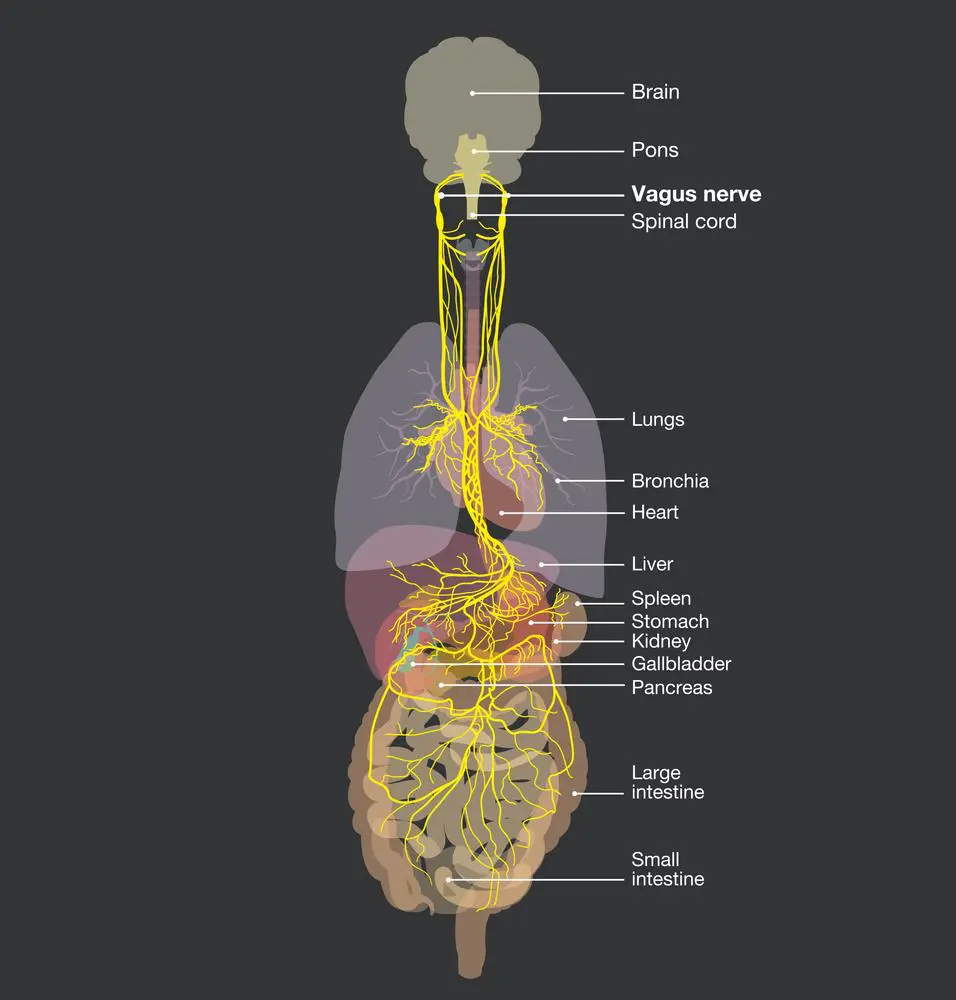
The vagus nerve plays a major role in physical and mental health. Learn how chiropractic care for the vagus nerve alleviates the symptoms of damage.
Chiropractors help vagus nerve health by realigning the spine and correcting misalignments.
When the spine is in alignment, it puts less pressure on the nerves, including the vagus nerve. This can help reduce or prevent symptoms of vagus nerve damage, such as heartburn, indigestion, and GERD.
Chiropractors can also help vagus nerve function by helping to improve communication between the brain and the gut. This can help improve digestion and overall gut health. Chiropractic adjustments can also help improve blood flow and oxygenation to the nerve, promoting healing.
The vagus nerve also plays a role in emotions and behavior. It's thought to help control anxiety and stress and may be involved in depression. Some research suggests that stimulating the vagus nerve may help improve mood and symptoms of depression.
The vagus nerve is a long, wandering nerve that extends from the brainstem to the abdomen. It is the longest cranial nerve in the body.
The vagus nerve controls various vital body functions, including heart rate, digestion, and breathing. It plays a crucial role in regulating the immune system, and damage or dysfunction can lead to many health problems.
The vagus nerve is responsible for several important bodily functions, including heart rate, digestion, and breathing. When this nerve becomes damaged or diseased, it can lead to many health problems.
One of the most common conditions that affect the vagus nerve is obesity. Obesity can cause the nerve to become damaged and dysfunctional. This can lead to several health problems, such as heart disease, high blood pressure, and diabetes.
Another common condition that affects the vagus nerve is stress. Stress can cause the nerve to become overworked and damage its function. This can result in other health problems, such as anxiety and depression.
The vagus nerve is a complex bundle of nerve fibers that originate in the brainstem and extend through the chest and abdomen. It is essential in controlling heart rate, blood pressure, digestion, and other vital body functions.
Damage to the vagus nerve can cause a wide range of health problems, including:
Inflammation is a process our body uses to protect itself from infection or injury. It occurs when the immune system sends white blood cells and other chemicals to the area of injury or infection. The chemicals cause the tissue to swell, which helps keep out bacteria and other harmful substances.
Inflammation can be helpful in small amounts, but it can damage tissues and organs when it persists for a long time. Chronic inflammation is linked with many diseases, including heart disease, arthritis, diabetes, and cancer.
There are a variety of digestive disorders which affect people in different ways. Some common disorders include Crohn's disease, irritable bowel syndrome (IBS), and celiac disease. Each of these conditions can cause a great deal of discomfort and distress.
The vagus nerve sends signals between the brain and the gut. If this nerve is damaged or not functioning correctly, it can lead to problems with digestion. This can result in many symptoms, including nausea, vomiting, diarrhea, constipation, and abdominal pain.
Your immune system is a complex network of organs, tissues, and cells that protect your body from infection and disease. The vagus nerve is one of the main pathways that help control the immune system's function.
The vagus nerve connects the brain to many essential organs in the body, including the heart, lungs, and gut. It helps to regulate vital functions like breathing, heart rate, and digestion. The vagus nerve also sends messages to the immune system, telling it when to activate and how much response is needed.
The vagus nerve is a cranial nerve originating in the brainstem and extending down to the abdomen. It controls many of the body's involuntary functions, including heart rate. The vagus nerve can be activated by deep breathing, which is why yoga and meditation are effective methods for slowing your heart rate.

The vagus nerve provides motor control to the pharynx and larynx and sensory information from these regions. It also controls the muscles of the gastrointestinal tract. Damage to the vagus nerve can result in difficulty swallowing.
The vagus nerve plays an essential role in the autonomic nervous system by innervating the heart, lungs, and digestive tract. The vagus nerve also affects the central nervous system, regulating mood, stress, appetite, and sleep.
The vagus nerve is a crucial component in your parasympathetic nervous system, which controls many unconscious processes and functions inside your body.
If you're having problems with excessive saliva production, something may be interfering with your vagus nerve function. Possible causes can include everything from stress and anxiety to injury or illness. Addressing the underlying cause is vital if you're going to be able to fix these issues.
The vagus nerve may also play an important role in speech development. It helps us develop speech by regulating the timing and coordination of certain muscles in our tongues and mouths.

In some cases, the vagus nerve can cause abdominal pain when there is inflammation or damage to the nerve.
If you are experiencing abdominal pain related to problems with your vagus nerve, talk to your doctor about potential treatment options. Your doctor may recommend medications to help reduce inflammation or pain and lifestyle changes such as eating a healthy diet and staying active. Surgery may sometimes be necessary to treat your vagus nerve-related abdominal pain. You can manage your symptoms and improve your quality of life with the proper treatment regimen.
One potential cause of nausea associated with the vagus nerve is irritation or damage. For example, if the vagus nerve becomes compressed due to a physical injury or trauma, it may send signals to the brain, indicating that the body is experiencing nausea.
Additionally, certain medical conditions, such as gastroesophageal reflux disease (GERD), can irritate and inflame the vagus nerve, resulting in feelings of nausea.
Several other factors may contribute to nausea associated with the vagus nerve, including changes in hormone levels and alterations in gut bacteria. In some cases, medications and supplements can also disrupt the delicate balance of hormones in the body and trigger feelings of nausea.
There is some evidence that chiropractic treatments can improve the health of the vagus nerve. For example, massage and adjustments may help to improve blood flow and nerve function in the area, which could help to reduce symptoms like nausea, vomiting, and dizziness.
Your vagus nerve is responsible for many things, including your heart rate, digestion, and immune system. Adjustments help to keep the vagus nerve functioning properly, improving overall health and well-being.
Several chiropractic treatments can improve the health of the vagus nerve. Adjustments help to keep the nerve functioning properly, while massage can help to stimulate it and enhance communication between the brain and the body. Exercises that work on the core muscles can also help to improve vagus nerve health. When the vagus nerve is healthy, it can help to improve overall health and well-being.
Chiropractic treatments are a great way to improve your health and well-being. If you're experiencing health issues related to your vagus nerve, it may be time for chiropractic treatment. There are several ways to know if it's time for chiropractic treatment, including symptoms of vagus nerve dysfunction and an evaluation of your overall health.
Symptoms of vagus nerve dysfunction include problems with swallowing or speaking, hoarseness, chronic cough, chest pain, heartburn, and GERD. If you experience any of these symptoms regularly, it may be time for chiropractic treatment. Evaluating your overall health is crucial in deciding whether or not to seek chiropractic care. Your doctor can help you determine if chiropractic treatments are right for you.

© Accident Care Chiropractic | Hablamos Español
Located in: North Portland, NE Portland, SE Portland, Gresham, Clackamas, Oregon City, Hillsboro, Bethany, Beaverton, Tigard, Forest Grove, Woodburn,
McMinnville, Keizer, Salem, South Salem, Bend, Springfield, Vancouver, Hazel Dell, East Vancouver, Pasco, Kennewick, Lakewood.
We Specialize in Car Accident Treatment & Recovery
Home | About Us | Testimonials | Blog | Sitemap | Privacy Policy | Services | Locations | Contact Us